PSA: Google is Your Competitor in Search, Feel Free to Cry

This is a public service announcement to wake you up to the fact that Google is competing directly with you on all search engines, including their own. This is a known thing in the SEO community, but this post is for the rest of you. I touched on this topic in this massive post of SEO and Content Marketing Tips, but will go deeper here. I know I said you can feel free to cry, but that’s not really going to help. No worries-not all is lost. In the post I linked to above, I point out what you can do to defeat your competitors (even Google) in search.
Google Hired an SEO
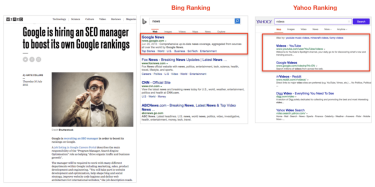
I’m not hating on Google in any way. I rather admire their growth-focused mindset and the fact that they doubled down on SEO. I spend so much time trying to convince big brands that they need SEO and great content marketing to grow their businesses. Some brands still don’t get this and it’s a shame because SEO and content marketing has been used to grow brands and disrupt industries. TripAdvisor used it to disrupt the hotel industry. NerdWallet is doing it in finance. Casper is doing it for beds. Facebook used SEO to break the coveted 100 million member number (see video below). Now, Google has hired an SEO and is using SEO and content marketing to grow their site traffic and compete at the keyword level with any site that is relevant for a topic they want to own. I admire that because they know SEO is valuable and that’s why I know SEO is not Dead and won’t be dying anytime soon. What I don’t like is how their site updates are taking valuable traffic from other sites. I can go toe to toe with any SEO, but it’s hard to beat some of their widgets and functionality.
The Background
Rand Fishkin, the Wizard of Moz, tweeted a while back about Google absorbing some of eater.com’s traffic despite Eater.com being optimized to deliver a great experience for their website visitors.
Feels like Google being cruel to @Eater. They have a fast site, great UI, superb results, but nope. G’s taking their traffic anyway. pic.twitter.com/p0ydvKEbEt
— Rand Fishkin (@randfish) January 26, 2017
Google has been rolling out updates to their website that are supposed to help publishers and brands create an amazing experience for their users. However, much of their site updates actually take website traffic away from brands and publishers which is bad for your business.
Why This is Bad for Your Business
Bad for Publishers
This is bad for your business because most publishers monetize their website traffic so if they get lower web traffic (because Google is taking some of it) then they have less traffic to sell, which directly affects their revenue.
Bad for Brands
It’s bad for brands because if people don’t visit your website, you get less data about them. Getting 1st party data on your customers and potential customers allows you to create efficient advertising and create solutions to their problems.
Bad for E-commerce
This is terrible for e-commerce sites because if you are getting less site visits, you are getting lower sales.
Google’s Site Updates
Knowledge Graph
The Knowledge Graph is a site function on Google that pulls information about your brand and various topics from sources like Wikipedia.
Why it Hurts You: This hurts you because even if you rank well (like in the example below). Google gives the search a ton of information on the topic and on the brand. People no longer actually have to click on your website because they can get the information from Google.
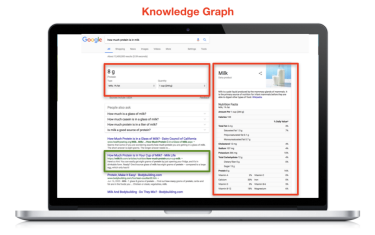
Accelerated Mobile Pages (AMP)
AMP pages were rolled out to give brands a way to create content that is lightning fast and performs extremely well on mobile devices. It’s fast because the code is simplified and Google caches the page and serves it from their site. Google rolled this out to publishers first and then the rest of us.
Why it Hurts You: In the past, Google was getting the traffic and URL association from these pages since they are serving the content. Publishers were outraged by this and Google worked hard to make AMP pages better . Google now gives you the option to click and visit the brands site, but the lack of control over your own content should worry you. I believe that you should be using AMP pages because they perform extremely well on mobile, but you have to be aware of the pros and cons of doing so.
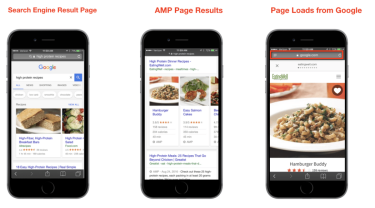
Google Answer Box
Google’s Answer Box allows you to get quick answers to a lot of questions. This is what powers voice search on Google home and is actually very useful. However, Google is taking your content to answer the questions. It is extremely important to rank in these answer boxes because it pushes your competitors below the fold and there is currently only one result on voice search.
Why it Hurts You: This is less painful for you, but the fact that people don’t have to visit your site to get an answer prevents you from getting 1st party data from them. Again, you have to rank in these answer boxes, but you need to know the pros and cons of this.
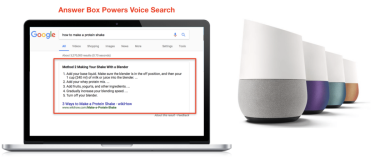
Google Widgets
Google loves widgets and they have some very cool ones. I believe that they produce these widgets to target keywords that have high search demand. For example, the term “currency converter” gets 12,000,000 searches a year. So not only do they have a widget for it, they have a page that is optimized for the term as well.
Why it Hurts You: This search term is very valuable but the companies who can rank for this term and monetize it have some serious competition with Google. Western Union is one of my clients and ranking well for this term would literally increase their revenue. We are not targeting the term, but anyone in the money transfer space and finance will have to beat Google for this term.
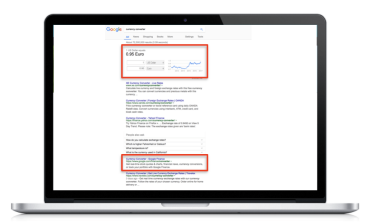
Google Flights
The Google flights widget should alarm any brand in the travel industry, especially if you are an airline. You can book a flight directly via this widget. Google’s flight landing page is also ranking well for flight related terms. Google then sells this traffic back to you.
Why it Hurts You: TripAdvisor built a business with a market cap of $3 billion by ranking well on search engines for terms like this. TripAdvisor would then sell that traffic to the hotel brands who were too slow to understand the power of search. Now Google is basically doing the same thing. It hurts you because it’s hard enough to fight off your competitors in this highly competitive market. The TripAdvisor SEO team is world class, but now you also have to compete with Google.
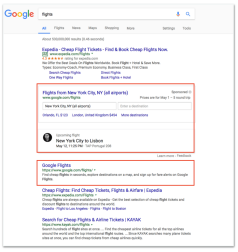
Google’s Efforts Have Paid Off
Google’s widgets and their focus on SEO has paid off tremendously for the search engine. Google topped Search Metric’s list of websites that have increased their organic site traffic year over year. In 2016, Google’s organic visibility increased by 24%.
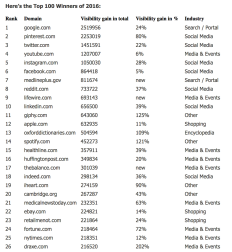
Google also sits at the top of Alexa’s (not to be confused with Amazon Echo’s Alexa) list of the worlds most visited websites. What’s most impressive about this is that 12 of their websites (Google.ca, Google.it, Google.es etc) sit in the top 50 spots on this list.
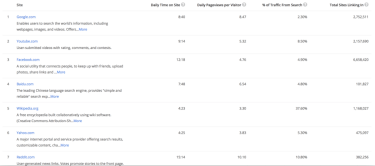
The reason why Google dominates these lists becomes very clear when you compare the total number of keywords they rank for on their own search engine v.s Bing or Facebook.
Google Organic Keyword Ranking and Growth
According to SEMrush, Google has increased the number of keywords they rank for on their own search engine. Check for yourself here.
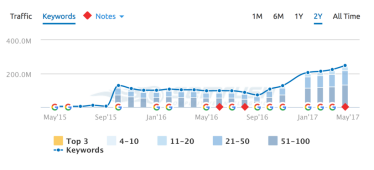
Bing Organic Keyword Ranking and Growth
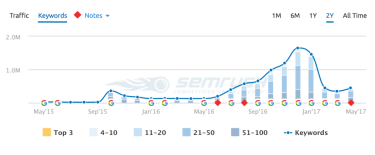
Facebook Organic Keyword Ranking and Growth
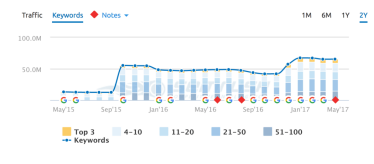
Why Google Has to Do This
Google is a business and like all businesses, Google is competing for the time and attention of people on the internet. The more of your time and attention they get, the more data they collect on you and the more they can sell back to advertisers. Their search engine is great at helping us to find what we want and then leave. That’s a problem now because Facebook has an enormous dwell time on their site. People go to Facebook and they stay there for long periods of time instead of leaving like they do when they go on Google.
Facebook Statistics
- Facebook takes up 22% of the internet time Americans spend on mobile devices, compared with 11% on Google search and YouTube combined.
- Users spend an average of 20 minutes per day on the site.
- Facebook accounts for 62% of social logins made by consumers to sign into the apps and websites of publishers and brands.
Plus Facebook has extended its reach because of their acquisition of Instagram (IG). In addition, older folks love Facebook and are now learning to use IG. I can’t even curse on Facebook anymore because I know my mom is watching. Your mom is probably on Facebook right now creeping on your photos, liking stuff, commenting and just dwelling away. eMarketing predicts that brands will continue to increase spend on both Facebook and Google, but brands are spending a ton more on Facebook which eats into their budget for spending on Google.
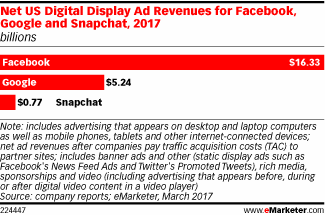
Plus, Facebook has one of the most powerful social search capabilities which allows you to be very granular with how you target people. Once people really start to use Facebook as a search engine, Google will be in serious trouble.
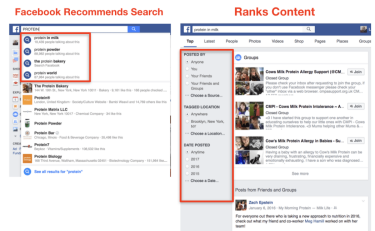
That being said, Google has to compete with you and everyone in search because they need to continue to grow the amount of people they can reach with their ads. A lot of their updates, like the widgets and Knowledge Graph, are built to increase the amount of time you spend (dwell) on Google.
This is extra important because most of the major social platforms are getting into the search business. Pinterest just rolled out their paid search product and so did Apple. Katelyn and her team were just in my office showing us Apple’s paid search product for the App Store. Apple’s search product is amazing. It drives cost effective app downloads for my clients, which in turn, takes budget away from Google.
The Takeaway
Google is your competitor in search, whether you like it or not. If you are not using cross channel search and content marketing to grow your business, then it is only a matter of time until you become irrelevant. These SEO tips outline what you need to do to dominate your competitors and Google.

